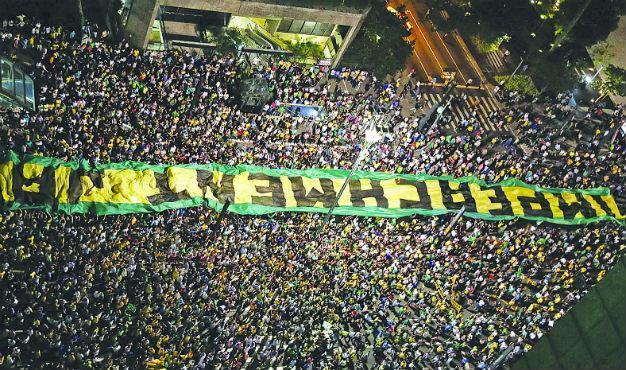Protests erupt in Brazil after release of Rousseff-Lula recording
BRASILIA – Agence France-Presse

AFP photo
Protests have erupted in Brazil after a recorded phone call between President Dilma Rousseff and her once-popular predecessor was released, suggesting that she appointed him to her cabinet to spare him from arrest for corruption.Rousseff appointed Luiz Inacio Lula da Silva as her chief of staff on March 16 hoping that his political prowess can save her administration. The president is battling an impeachment attempt, a deep recession, and the fallout of an explosive corruption scandal at state oil giant Petrobras.
However hours after Lula’s appointment, federal judge Sergio Moro, who is heading a probe into the Petrobras scandal, ordered the release of a call recorded by police suggesting darker motives.
Rousseff called Lula’s bugged phone to tell him she would be sending him the official decree nominating him as her chief of staff so that he could make use of it “if necessary.”
That extract seems to confirm that Lula’s nomination to the post was aimed at sparing him possible arrest for corruption.
Cabinet ministers can only be tried before the Supreme Court in Brazil, and ministerial immunity will now protect Lula from prosecution in criminal court.
Lula vigorously denies involvement in the scandal, in which investigators say construction companies conspired with Petrobras executives to overbill the oil giant to the tune of $2 billion, paying huge bribes to politicians and parties along the way.
Rousseff’s office said the phone call was merely to discuss a procedural matter.
The recording’s release caused an uproar in Congress, where furious opposition lawmakers shouted “Resign! Resign!”
Some 2,000 people spontaneously gathered in the capital Brasilia to demand that Lula step down and Rousseff leave office.
“Instead of explaining himself and assuming his responsibilities, former president Lula preferred to flee out the back door,” said lawmaker Antonio Imbassahy, lower house leader for opposition party PMDB.
“It’s a confession of guilt and a slap to society. President Dilma, by appointing him, has become his accomplice,” Imbassahy added. “The final chapter in this story will be her impeachment.”
As night fell, another protest broke out in Sao Paulo.
“Resign! Resign!” shouted several thousand protesters gathered outside the building housing FIESP, a powerful federation of Sao Paulo industries. The building was illuminated in green and yellow - Brazil’s national colors - and included a large inscription that read “Impeach now.”
The impeachment push is not directly related to the corruption scandal, but has advanced in tandem with it.
The president’s office responded by announcing that “judicial and administrative measures” would be taken to “repair the flagrant violation of the law and the constitution committed” by judge Moro, but gave no specifics.
















